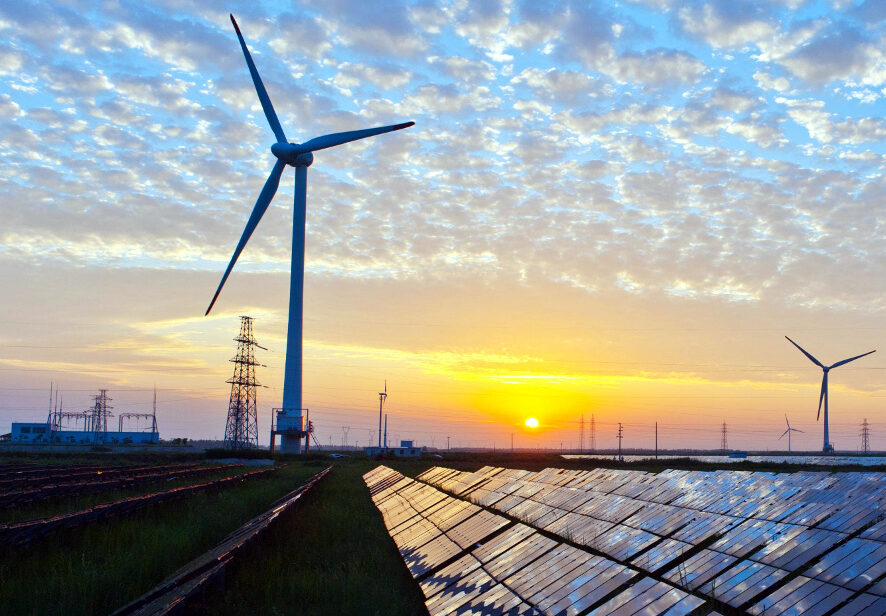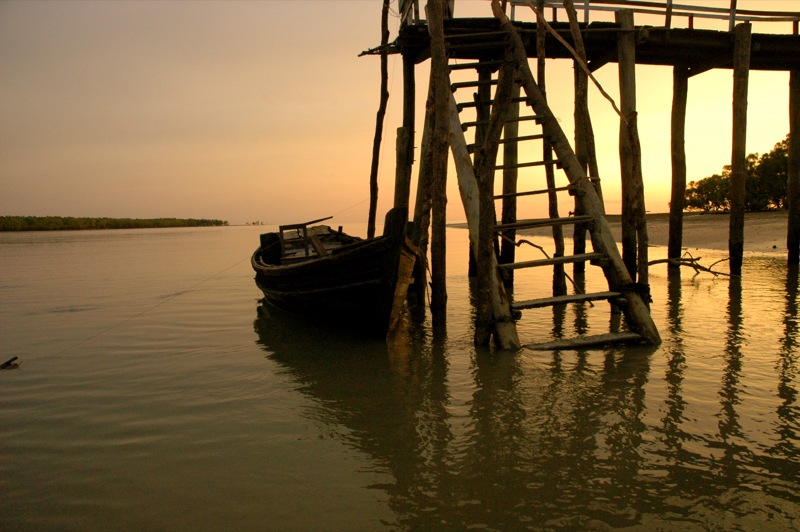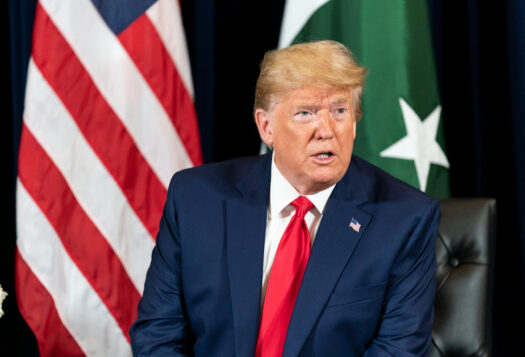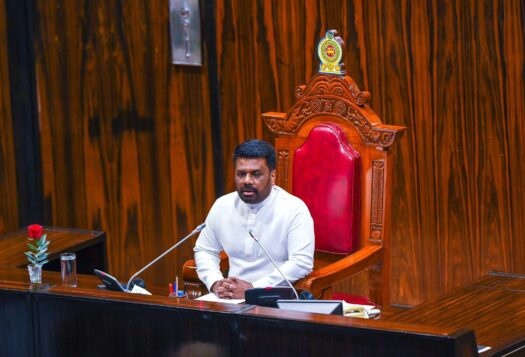
Bangladesh is considered one of the most vulnerable countries to climate-induced risks and ranks seventh among the extreme disaster risk-prone countries. The Climate Risk Index 2021 states that climate change has caused grave humanitarian losses with casualties counted at 11,450 people. Bangladesh endured economic losses amounting to USD $3.72 billion and witnessed 185 extreme weather events from 2000 to 2019 as a result of climate change. The country faces extreme climatic threats and hazards including tropical cyclones, floods, riverbank and coastal erosion, droughts, and landslides.
To address the deteriorating global climate, Dhaka introduced a new strategy focused on forging vibrant ‘green partnerships.’ Through diplomatic outreach, “green partnerships” foster capacity development, technological development, and cooperation to share best practices and technical knowledge among partner countries. As Bangladesh envisions a green future articulated in the Mujib Climate Prosperity Plan (MCPP), forging robust ties and linkages with countries facing similar hazards and climate threats will guide Bangladesh in navigating the climate crisis.
Bangladesh’s Collaboration with Denmark for Renewable Energy Development
Bangladesh-Denmark relations epitomize the scope of a green partnership as climate change has recently gained prominence in the bilateral relationship. Recognizing the “gross unfairness” of the disproportionate impacts of climate catastrophes on developing countries, Denmark’s government pledged USD $13 million to countries that are battered by climate change.
Bangladesh endured economic losses amounting to USD $3.72 billion and witnessed 185 extreme weather events from 2000 to 2019 as a result of climate change.
Denmark and Bangladesh have forged deals in the realm of green and clean investment and technologies for gearing sustainable development, finalized at the Second Bangladesh-Denmark Political Consultations. Denmark expressed interest in broadening the fields of cooperation to energy efficiency, renewable energy, circular economy, sustainable water management, climate adaption, ocean conservation agro-food processing, and Information and Communication Technology (ICT). The bilateral meeting also finalized the Bangladesh-Denmark Joint Action Plan for the period 2023 to 2026.
Recently, two Danish companies – Copenhagen Infrastructure Partners (CIP) and Copenhagen Offshore Partners (COP) – broached a USD $1.3 billion investment proposal to the government of Bangladesh to produce 500 megawatts of offshore wind energy. Denmark is a trailblazer in the arena of wind power development and the country’s electricity sector is reliant on wind power, comprising 53.6 percent of the total electricity consumption in 2022.
In contrast, Bangladesh’s current energy mix is unduly dominated by fossil fuels. Bangladesh’s renewable energy policy of 2008 envisioned a goal of ten percent electricity sourced from renewable energy but has only managed a meager three percent of power from renewable sources. The existing renewable-non-renewable energy ratio is not sustainable, since existing natural gas reserves are not adequate in addressing escalating energy needs. In this context, the know-how and technological knowledge of Denmark will significantly assist Bangladesh in addressing the renewable energy needs of Bangladesh.
Tying up with the Netherlands for Delta Management
Bangladesh and Netherlands are separated by continents, but both countries share identical geographical and topographical features. Both Bangladesh and Netherlands have relatively wide coastlines and face risks of rising sea levels. Their shared deltaic landscape has fostered mutual cooperation to eliminate climate risks. Bangladesh’s government ratified the Bangladesh Delta Plan (BDP) 2100 in collaboration with the water management consultancy firm Dutch Water Sector and with integrated finance mechanisms with the Netherlands. BDP entails a long-term mega plan spanning 100 years that strives to buffer the negative effects of climate change and disasters in Bangladesh while ensuring long-term food security and spurring economic growth. Under the framework of the Delta Plan and using private-public modalities, the Netherlands is engaging in technical cooperation with Bangladesh in critical areas including land reclamation, flood defense, river dredging, and capacity development. The Netherlands has pledged support of USD $8.90 million for the implementation of the Delta plan.

Connecting with International Organizations
Bangladesh has also joined various non-state forums such as Partnering for Green Growth and Global Goals 2030 (P4G). P4G, a platform launched by a group of countries supported by international organizations—for unlocking opportunities on a cluster of themes related to climate change such as energy, food and agriculture, circular economy, and sustainable cities. The collaboration with the P4G can offer avenues for innovative approaches and business models to assist Bangladesh’s smooth graduation from the category of ‘least developed country’. P4G has proven to be a pivotal platform to promote accessibility to markets, technology, and sustainable finance. Furthermore, P4G promotes a multi-stakeholder approach to advance a spectrum of Sustainable Development Goals (SDG 2, 6, 7, 11, and 12), which aligns with Bangladesh’s priorities.
Green investment and financing are the cornerstones for sustaining green commitments. The World Bank (WB) has bolstered Bangladesh’s climate resilience through numerous policies. In April this year, the World Bank rolled out USD $1.25 billion for fostering resilient, green growth in Bangladesh. The World Bank has also initiated a new country partnership framework (CPF) for Bangladesh for the period of 2023 to 2027 and endorsed USD $1.25 billion in financing for three new projects. On June 7, 2023, the World Bank and the Government of Bangladesh inked financing instruments totaling USD $858 million to spur climate-resilient agricultural growth and food security. Furthermore, Bangladesh has partnered with United Nations Industrial Development Organization (UNIDO) for the prevention of marine litter and ensuring sustainable plastic usage.
The Need to Emphasize South-South Green Partnerships
Bangladesh needs to emphasize South-South partnerships to further fortify the web of its green partnerships. The unique vulnerabilities and ways of coping in Global South countries can guide Bangladesh in adopting similar indigenous mechanisms. Besides, promises from developed countries to aid the Global South in climate resilience often sound hollow and fulsome with little implementation. Given the tepid concerns of Western countries, Bangladesh needs to build connections with countries that face the same hazards.
The unique vulnerabilities and ways of coping in Global South countries can guide Bangladesh in adopting similar indigenous mechanisms.
For example, there is untapped potential in expanding Bangladesh-Thailand relations to the realm of a green partnership. Thailand is reorienting its economic model to a Bio-Circular-Green or BCG economy model to more efficiently harness its resources. The BCG model is a process of conservation of natural and biological resources through the development of high-value products and services. The know-how of the BCG model drawn from Thailand will help Bangladesh in crafting an indigenous version of the model. The climate policies and priorities of the two countries align well and these policy similarities should be channeled into a more integrated partnership.
Bangladesh had been explicit in its climate agenda and has issued a detailed roadmap called the Mujib Climate Prosperity Plan. Additionally, Bangladesh has spearheaded and mobilized the climate concerns of developing nations, especially within the organizational framework of the Climate Vulnerability Forum (CVF). In the 4th CVF-COP26 dialogue held in London in 2021, the leadership of Sheikh Hasina was lauded and the contents of the Mujib Climate Prosperity Plan garnered support. In such a context, Bangladesh can broaden its climate partnerships to include developing third-world countries that are similarly vulnerable to climate crises.
Conclusion
Bangladesh strives to promote a multi-sited and multi-pronged climate change strategy that emphasizes interwoven linkages across geographical boundaries for addressing critical climate change issues. However, in order for this to be successful, Bangladesh needs to diversify its sites and fora for conducting climate diplomacy. Annual summits such as COP fail to be compelling sites for accommodating Bangladesh’s climate concerns. The climate advocacy of Bangladesh needs to extend beyond the confines of COP and needs to frame a holistic climate change adaptation agenda that does not solely rely upon the promises of Western developed countries. In this context, the Bangladeshi government is forging robust bilateral ties with countries across the world to augment its climate diplomacy and must continue to do so, prioritizing South-South partnerships.
Also Read: Climate Displacement in South Asia and India’s Imperative to Act
***
Image 1: Renewable Energy on the Grid via Wikimedia Commons
Image 2: Pier in Ganges Delta via Wikimedia Commons


